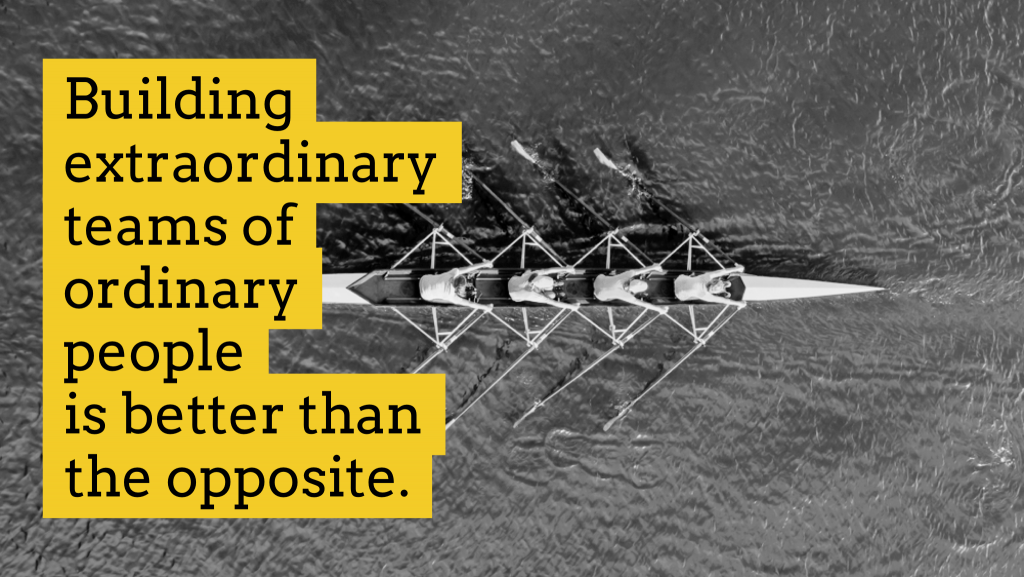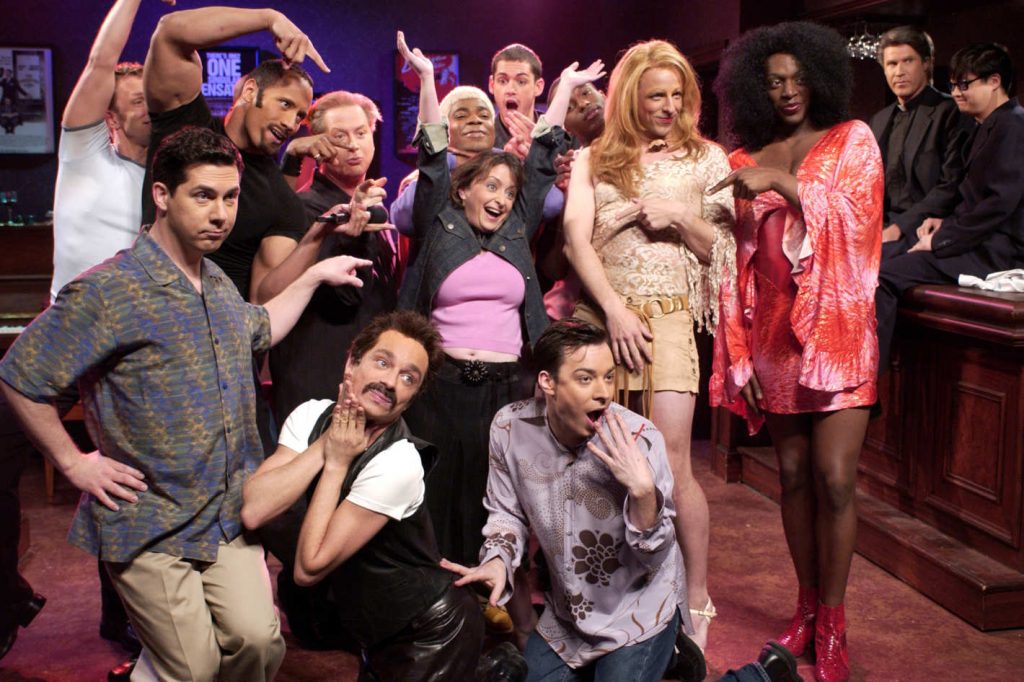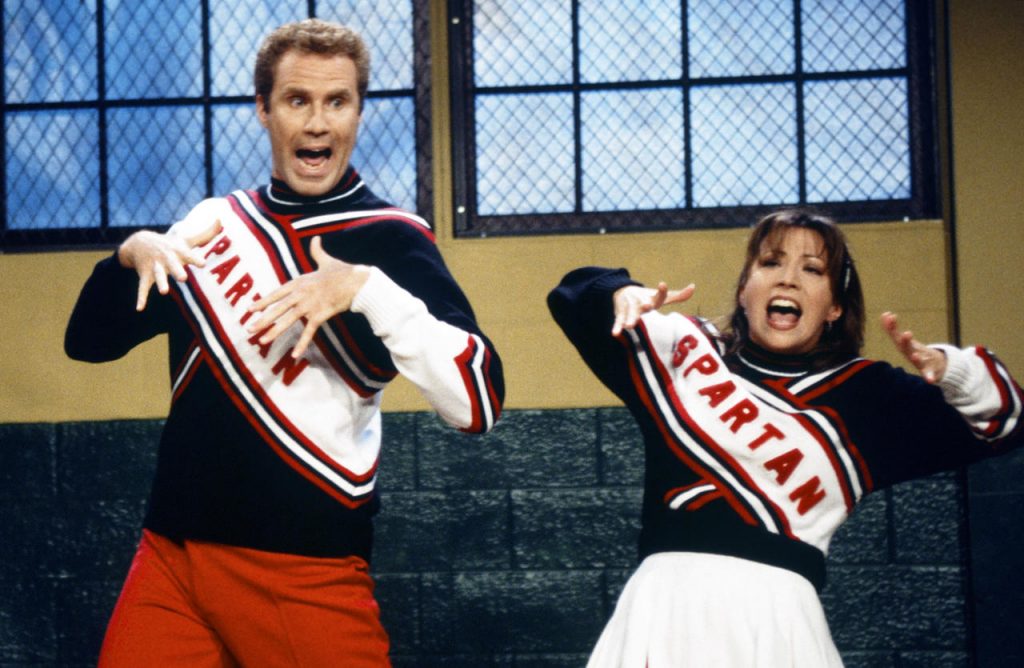
Today I’d like to suggest that building extraordinary teams of ordinary people is a better move than creating ordinary teams of extraordinary people. Makes sense, right?
Can we start with something I know we can all agree with? No matter what team you assemble, they’re never going to be the absolute best. I mean, maybe you can snag an incredible person here or there, but the world conspires to keep all the amazing people from joining a single organization – just look at the NBA.
Remember that Lee Iacocca quote?
Lee Iacocca once said, “I hire smart people and get out of their way.” And there’s that Steve Jobs quote about hiring smart people but not telling them what to do (because you should let them tell you what to do).
It’s the notion that if you hire amazing people, and just get out of their way, they’ll do amazing things. Just don’t mess it up! Hire super bright people and things will take care of themselves.
But I’ve not found that to be true. Even with brilliant people on the same time, challenges arise. Conflict arises. There can only be so many cooks before the meal is ruined.
It turns out brilliance isn’t needed
Over the past couple decades I’ve managed all sorts of teams, filled with all sorts of people. And in every case, our team has eventually – either early in the process or later – had to interact with customers. They’ve had to interact with the outside world, not just the brilliant people in our holy huddle.
And in those cases, brilliance was almost never the most essential component to success with our clients.
Listening. Empathy. Consideration. Did I mention listening? Creativity. Oh, and listening.
These things were critical.
But in more than twenty years of building software, solving deep and highly technical issues, working with small, medium and enterprise customers – brilliance was rarely needed.
In fact, sometimes I’ve paid a premium for brilliance that was too costly…
The Reggie Jackson Effect
When you’re chasing after brilliance, after superstars, here’s what you find:
- You find that discovery only comes because they’re already known
- You find that the nature of you knowing them means others do too
- You find that the result is higher demand drives their price up
This is what I call the Reggie Jackson effect.
Why? Because Reggie Jackson, the famous baseball player, was known for his time on the A’s and Yankees as “Mr. October.” October is when the playoffs are held, and his performance during the playoffs was a key part of the success of both teams. Everyone knew his name.
That reputation is what the Los Angeles Angels bought. They paid a premium to get Reggie “Mr. October” Jackson to bring the magic to their team.
A Harvard Professor made a discovery
When we hire high flyers, we not only hope they’ll bring their skills and talents to our organization. We also want them to replicate their success – in our own context.
One Harvard professor reviewed the top talent at investment firms, looking at the top players in the game, and watching not only their performance but what happened when they were recruited from smaller, boutique firms, to the larger ones you’ve heard of (like Merrill Lynch).
Success is rarely an individual sport. It's the byproduct of a great team, often with the right resources and a great culture. Click To TweetWhen those bigger firms hired the top talent with proven and significant success, they paid a premium. They knew it. They were ok with it. They were basically saying, “It’s an investment.”
And in about half the cases, those high performers, like Reggie Jackson, underperformed by an average of 20%. And not just for a year or two. For the next five years!
Success is rarely an individual sport. It’s the byproduct of a great team, often with the right resources and a great culture. Pluck out a ‘superstar’ and you may end up overpaying for underperformance.
Learning from SNL
The thing I love about SNL, even though it’s not perfect, is that it starts with some actors we don’t know. Over time, as they find the perfect skits and other actors to work with, we get to know and love them. We think they’re the heart of the show. And then they leave.

But SNL doesn’t turn off the lights and call it quits. It starts all over again and introduces new people. And we say, “These folks aren’t all that good.” But then they find the perfect skits and other actors to work with, and we get to know and love them all over again.
The brilliance of SNL is their commitment to bring people together, in a specific space, constrained by time, sharpened by a culture of production. Click To TweetCan you imagine if every couple years your very best talent just took off? Some companies already see this happen. And it’s a toss up as to whether they figure out how to handle it.
I’ve said it before, and I’ll likely keep saying it – the brilliance of SNL is their commitment to bringing people together, in a specific space, constrained by time, sharpened by a culture of production, to persist in developing content we love.
While we’re talking about it, what’s your take on the best SNL cast ever?
Ordinary doesn’t mean lacking talent
Extraordinary teams of ordinary people doesn’t mean I’m talking about people without talent. My example of SNL highlights that the actors on the show have talent. But when we first meet them, they feel pretty ordinary. It’s the work they do that shows us (after a time) how talented they’ve always been.
So what kind of talent are we talking about?
I bet you’ve likely seen the movie Miracle, right?
Or I bet you’ve seen the movie Hoosiers?
Maybe those are too old. What about Remember the Titans?
Or at least I can be sure you’ve seen reruns of Rudy, right?
Every one of those movies is about teams of talented people, for sure. But it’s also about the whole being larger than the sum of its parts.
Here’s what they have in common.
They care about their teammates. The right kind of ordinary people don’t send each other links to Let Me Google That For You. They help each other when someone gets stuck.
The care about their work. These are folks who choose, on their own time, or request additional time to go back and make something better because they’ve been thinking about things and they have ideas for improvement.
They hate losing, but can handle it. We all know that losing is a part of life. We can’t win at everything. But these folks love winning and are willing to work hard to get the win. Nevertheless, they won’t lose their integrity just for win, or spend days blaming people.
They constantly work on their communication. Ordinary people come in two flavors – people who are lazy about their communication, and people who prefer clarity. The talented kind seem to always be the ones working on being understood.
They learn from the past. It’s not like these extraordinary teams never make mistakes. But they rarely make the same ones over again. They’re the ones that huddle up to review what happened, even before you suggest it.
My Current Extraordinary Team
I have an extraordinary team that I get to work with at Liquid Web. And it can feel like a bit of a stretch to call them ordinary people because when you get to know them, the talent shines thru really quickly.
I know this is shocking, but the best teams are developed by teaching them how to work together as a team. Click To TweetWhat makes them special isn’t just what each brings to the table. Instead, it is how they work together. Each one has something they’re really talented at. But more often than not, I work to assign them to objectives in pairs or trios.
That’s because the best teams are often developed by teaching them how to work together as a team.
To bring it back around to SNL, this is the genius of Lorne Michaels. Every Monday afternoon he would pull everyone, including the special guest, into a room and they’d have their pitch session.
You can’t have a cast as big as they regularly have and have everyone pitching their own ideas. Quickly you learn to collaborate on skits together. Lorne forces that – sometimes even pushing for specific collaborations.

And that’s when the magic happens.
In order to build an incredible team, I need to put people together, constrain the time they have available, force them to produce, and leverage as much positive peer pressure as I can. And that’s how you end up with the genius of Will Farrell and Cheri Oteri in an unforgettable skit.
In other words, building amazing teams means finding generous, gifted, talented people and putting them in pressure cookers together.
That’s how you get extraordinary teams from ordinary people.